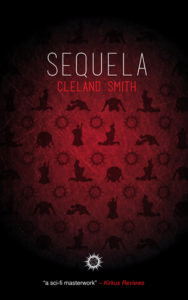
Sequela wasn’t necessarily the book that excited me most after making the first pass through my team’s first round assignment of SPSFC books, but it’s safe to say that the audacious premise and polished prose of Cleland Smith’s debut caught my curiosity like nothing else in our round of extended previews.
Sequela takes place in a moderately near-future London and rests on a unique premise: sexually-transmitted viruses (STVs) have become a fashion statement. After all, they’re proof of either the wealth to purchase designer viruses or the desirability to share a bed with those who are, and neither trait is losing its shine anytime soon. The novel follows characters from three groups with entirely different aims: a mega-corporation pioneering newer and more exclusive designer viruses, an underfunded research group still dedicated to preventing illness, and a religious sect seeking to show the world the depths of its own depravity. In the center of all of this is Kester Lowe, a brilliant scientist who decides to take the money and enter the STV business.
By all rights, I shouldn’t have liked Sequela. There’s vastly more sex than I prefer in my reading, and though it’s not as graphic as one may expect from the premise, it isn’t exactly fade-to-black either. There’s hardly a sympathetic character to be found, and there’s no driving plot to make up for it, but rather several smaller plots converging into a finish that hints at resolution but shows no interest in tying every loose end or giving every player their just deserts.
And yet, Smith managed to keep me engaged from start to finish. The characters, while plenty frustrating (in their choices, not in how well they were portrayed), all had understandable motivations, and while a couple one-note villains were mostly interested in money and power, the rest had enough sympathetic moments to keep me invested in their fates, even I occasionally wanted to shake some sense into them. The storytelling did a great job of maintaining interest in the small plots, so I never really felt the pacing slow, even though it took most of the book to see how everything would coalesce. And, while the ending didn’t elevate the story to new heights, it did feel appropriate to the story, with partial resolutions mixed with ambiguities, comeuppance side-by-side with villains coming through unscathed.
It can be hard to evaluate a story that leans into an ending that feels more true-to-life. Because after all, I want to see the villains punished, the loose ends resolved, the wow moment of convergence. And Sequela doesn’t really deliver any of those. The way the subplots end all have a ring of truth, and they’re well-written, but a story with such a unique and eye-catching premise made me expect something more ambitious—a grand finale as opposed to a series of small steps, even if the small steps represent major triumphs or disasters in the lives of the characters.
Overall, it’s a story that doesn’t necessarily have a singular driving identity—part corporate thriller, part cautionary tale, part social commentary—but manages to weave its various threads together in an interesting and satisfying way. The eye-catching setup made me expect a more ambitious story than was ultimately told, but while I would’ve liked to see more depth from the villains, Sequela delivers several well-rounded characters, a well-paced, entertaining story, and an ending that feels true to what came before.
Recommended if you like: social commentary and cautionary tales that don’t resolve too neatly, characters that alternately earn your sympathy and your frustration.
Can I use it for Bingo? It’s hard mode for Revenge-Seeking Character, it’s a Debut, and it is of course Self-Published.
Overall rating: 14 of Tar Vol’s 20. Four stars on Goodreads.
SPSFC Score: 7/10 for my personal score. We will await results from the other judges before announcing an official team score.
